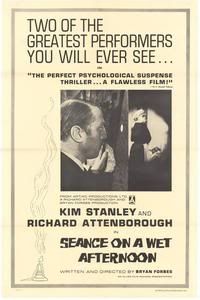
I'm led to believe that this film is one of those rare gems that often slips under the radar of critics who spend half their careers spewing out one "Top Ten" list after another. I crudely base this rationale on the fact that I consort with a great deal of film buffs, yet no one I know had ever heard of this film prior to my mentioning it. That being said, it is certainly a shame, for this is one of the best cinematic tales I've seen since I began this venture.
Kim Stanley is Myra Savage, an egocentric, eccentric psychic/medium who is bound and determined to have the world respect and crave her abilities. To achieve her goal, she forces her henpecked husband Billy, to kidnap the only daughter of an affluent family. If all goes according to plan, she will present herself to the parents, use her powers to locate the child, as well as the ransom money, and achieve world renown. Only...everything goes to hell. The plot is delightfully Hitchcockian in its own right, and it might even be regarded as a disservice to the film to classify it so quickly, for the pathos of Myra and Billy left me analyzing the film long after finishing it. Hell, I'm still chewing it over, because there's one other damning element to the film: for all intents and purposes, Myra's "power" is left ambiguous - as is whether her husband believes/knows if it is real. To think that she goads her husband into such an abominable act when he might believe that she's crazy and she knows that she's a fake is far more eerie that the interpretation that she's a legitimate medium.
Kim Stanley's performance is astounding, and thankfully the Academy acknowledged her role with a nomination - though the actual award would have been more fitting considering that she lost to the treacly performance turned in by Julie Andrews in "The Sound of Music." As for Attenborough, it's simply a crime that he wasn't nominated. There's so much complexity and quiet intensity to his character once you really start to scrutinize his performance. On a number of occasions, the camera is set tight on his face as Myra prattles on about the conversations she's had with the dead (particularly her deceased son) in an almost delusional manner. The expressions that come over his face as he tunes his wife over seem to indicate that he's thinking: how the hell did I get myself into this mess, why do I let me wife push me around, my wife is crazy, and a number of other thoughts all at once. It's a subtle manner of performance all too absent from films today and with a fantastic plot and moody cinematography, I can't help but recommend this film to everyone I can.
Watch the Trailer

I just Netflixed this -- what a great movie, and what a find. I'm on lookout for overlooked treasures from the 1960's, because for the most part that is my least favorite decade for movies, full of fluff like the aforementioned "The Sound of Music." Thanks!
ReplyDelete